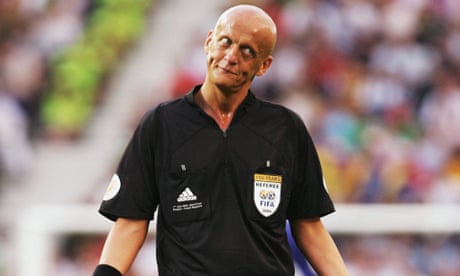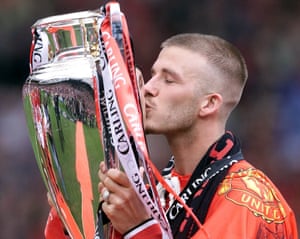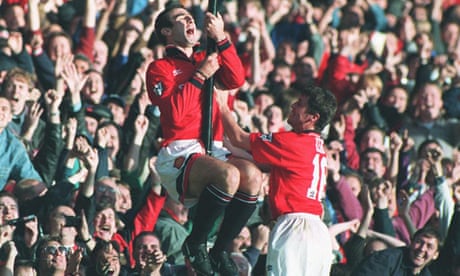David Beckham, you may have heard, is back at Old Trafford on Saturday afternoon, appearing in a Unicef charity match he helped to organise. Naturally all tickets have been sold, even though you could not have told Aston Villa or Manchester United fans from recent seasons that late-edition Robert Pires or Michael Owen were a treat to watch, but Beckham is good at this sort of thing.
Beckham, it must be admitted, is pretty good at most things. He might even be better in his present role as charity ambassador, clotheshorse, globetrotter and all-round good egg than he ever was at football but in all probability not. Even at this short distance from his retirement two years ago there is a danger of forgetting just how good Beckham was at football.

Celebrating Pierluigi Collina as the referee returns to action at Old Trafford
Read more
Strip away all the distractions, of which there were many, and the petty envy and mistrust, of which there was a surprising amount, and you are unquestionably left with one of the greatest of English post-war careers. Granted, Beckham did not win a World Cup, did not even come particularly close, and to that extent his place in the England and Old Trafford pantheon will always be secondary to Sir Bobby Charlton and others.
Yet if it is the misfortune of present generations of English footballers to be constantly and thanklessly compared to the Boys of ’66, Beckham has done more than most to compile an overall list of achievements worth weighing in the balance. He overtook Charlton’s England appearance record, for a start, and with 115 games for his country remains the nation’s most capped outfield player. Charlton won three league titles with United; Beckham managed six, then took himself off to play with distinction for Real Madrid and win the Spanish league in his final season.
Those are just the bare bones of the story. Not only is it difficult comparing players of wildly different generations and backgrounds, the distinction between a one-club player and someone who tested himself in more than a single country and culture is an added complication. As is the undeniable fact that Beckham played in a more consistently successful United side than even some of his most illustrious predecessors. Does that make his achievements greater or smaller?
If, as seems inevitable, Old Trafford orders a Class of ’92 statue at some point to stand alongside the famous trio of Best, Law and Charlton, the statistical comparison would be interesting, to say the least. The present statue, honouring the three household names from United’s 60s rise to become the first English winners of the European Cup (even if they did end up falling out with each other) boasts a total of seven league titles between the threesome.
Beckham has six on his own, plus one in Spain, and the Champions League medal collected as part of the 1999 treble. Gary Neville has two Champions League medals and eight English league titles. Paul Scholes can raise that by three more league titles, Ryan Giggs can go two further still. Were United to build a statue to Giggs, Scholes, Neville and Roy Keane, they would be honouring a quartet with a preposterous 39 league titles between them, not to mention FA Cups and European prizes. But while that foursome might be United’s most decorated, the plinth would not be complete without the presence of Beckham, arguably the most famous of the lot, and certainly the face of the Class of ’92 when they were still making their names on the pitch and proving Alan Hansen wrong about not being able to win anything with kids.
ADVERTISING
Advertisement
The Match of the Day pundit made that understandable, though now infamous, comment just over 20 years ago, when United lost 3-1 to Aston Villa on the opening day of the 1995-96 season. Beckham had made his league debut a few months earlier, and by the end of his first full season United’s unjustly maligned kids had won a second double.
While Terry Venables resisted calling him up during Euro 96, Glenn Hoddle awarded him a cap at the earliest opportunity on taking over as England manager. By the time Beckham played in Moldova in September 1996 he was already famous, courtesy of opening the season – one year on from the defeat by Villa – with an outrageous goal from the halfway line against Wimbledon. Taking a pass from Brian McClair, Beckham spotted Neil Sullivan off his line and had the confidence and technique to put the ball in the right spot from 50 yards out. He has since described it as his best goal but said the biggest thrill of all was receiving congratulations from an admiring Eric Cantona.
If it was now beginning to be realised that there was something out of the ordinary about this good-looking boy with the floppy hair and winning smile, it was confirmed a couple of years later when he took part in the first of his three World Cups. Early in the tournament in France, Beckham was not having the easiest of times. Hoddle appeared to have doubts about his concentration, and had left him out of the first two games.
Back home, opposing fans had begun to single him out for abuse on account of his relationship with Victoria Adams and perceived showbiz lifestyle, a largely unfair prejudice that would dog even his England career for the next couple of years. Then, when he should probably have been keeping his head down and working hard, Beckham was photographed on a night out with his girlfriend in Nice. Staying at Elton John’s villa, as you do. And wearing a sarong, as footballers generally don’t.
Advertisement
There was considerable front-page interest, as might be imagined, though when Beckham met up with back-page writers his concentration did not appear to have been adversely affected. Beginning by politely but firmly admonishing one journalist for misrepresenting him in a previous article, Beckham explained he had only ever wanted to be a footballer and was now living the life of his dreams. He was not about to let distractions from either the terraces or the media deflect him from his purpose, which was simply to fully explore his potential. “I can put up with any amount of stick from supporters,” he said. “I don’t necessarily like it, but I don’t let it affect me. I am the one who is being paid to play, after all. The people shouting at me have paid to come in and watch.”
That is not exactly an exclusive or even an original sentiment. Just about every professional footballer uses a form of that mantra as an aid to concentration and insulation against the more primitive terrace taunts. But Beckham did not merely trot out the line. He held his audience’s eye and argued his position articulately and reasonably. More than anything his self-assuredness was impressive and from that day on nothing he has done has come as a surprise to certain observers.

David Beckham kisses the Premiership trophy at Old Trafford after Manchester United claimed glory in May 2001. Photograph: Phil Noble/PA
He did rather let himself down with the petulant flick at Diego Simeone that helped bring one of England’s most promising World Cup campaign of recent years to an early close, though he could hardly have expected the referee to join his opponent in massively overreacting to the situation. He more than compensated for that lapse with the late free-kick against Greece that booked a passage to the next World Cup in Japan, completing a standout performance on home ground at Old Trafford that finally convinced the last of his England doubters. By that point he was England captain, Sven-Goran Eriksson having become convinced of his merits in next to no time. It wasn’t just that Beckham had the sweetest right foot in the country and the energy to get up and down the right wing all day, there was a winner’s attitude as well, a perfectionism and pride that rubbed off on the rest of the dressing room.
“His work ethic was fantastic,” Eriksson said. “He had fantastic stamina and a great right foot but he was also a super-professional football player, always trying to do his best for the team.”
Sir Alex Ferguson had other leaders available as captains of Manchester United, but saw the same professional qualities as Eriksson in Beckham. “He was extraordinary,” the former United manager says in his latest book. “When he first came to us he would train morning and afternoon then show up in the evening to join in with the schoolboys. At the start of each season we used to give all the players a bleep test to get a sense of their aerobic fitness, and Beckham was always off the scale. Cristiano Ronaldo was the same. He had this desire to become the greatest player in the world and was determined to do so. True winners are relentless. The very best players compete against themselves to become as good as they can be. They have to be dragged off the training ground.”
The eventual bust-up between Ferguson and Beckham, and the latter’s subsequent recasting of himself in Spain, the US, Italy and France, are mere details to an overarching theme. At any given stage in what by any standards was a remarkable career, Beckham knew where he wanted to go and had a shrewd idea of how to get there.

Manchester United 2-2 Liverpool: the Class of 92, Spice Boys and Cantona’s return
Read more
He did not do it all by himself – there was considerable assistance from Eric Harrison and other United youth coaches along the way and even a short loan spell at Preston North End played its part – but from the moment Beckham became a first-team regular he appeared fully armed and fully formed. There was no visible learning curve; here was someone who could play from the start and would spend the next 10 years or so simply getting better.
Complaining that he never won a World Cup is like holding the same grudge against Ronaldo or Lionel Messi. That is not to suggest Beckham deserves quite the same billing as that magical pair – he was always more grafter than genius – though he does deserve a lot more credit than he generally receives. For someone who only ever wanted to be a professional footballer he achieved his goal and plenty more in considerable style, and managed to remain modest about it.
Ronaldo, to judge from his faintly disturbing new vanity project, would like to be remembered as something between best in the world and God’s gift to the beautiful game. Beckham does not mind if posterity judges him solely on perspiration. “I hope people remember me as a hardworking footballer,” he said recently. “Someone who gave everything he had every time he stepped on to the pitch.”

No comments:
Post a Comment